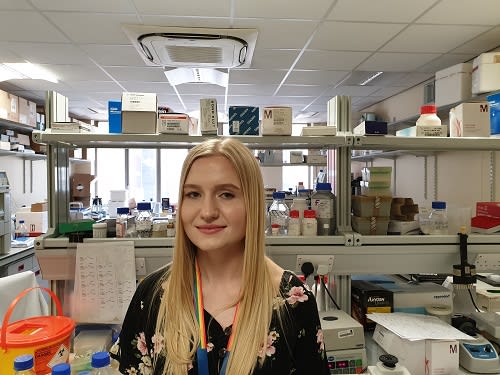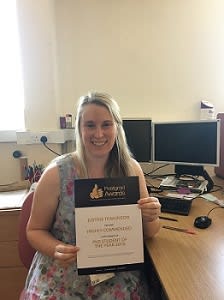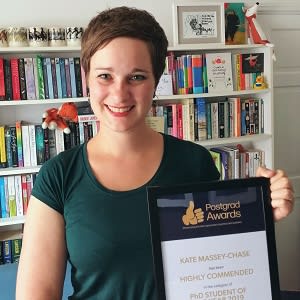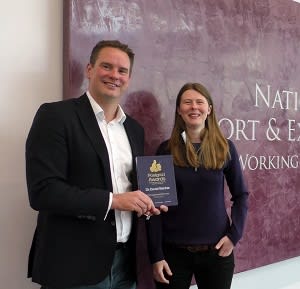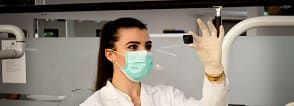Is a PhD for Me? Advice From Award-Winning Students and Supervisors
Starting a PhD can be a daunting prospect, filled with so many unknowns. How will research compare to undergraduate study, or a Masters? What will your supervisor and colleagues be like? How many hours will you spend per week on your project? Will you ever get outside the lab or library again?*
One important thing to remember is that you’re not alone. Each and every prospective PhD student starting their studies will have the same questions and concerns about their PhD studies. One simple way to answer those questions, and alleviate those concerns, is to hear from people who’ve been there before.
We recently crowned the winners of our first ever Postgrad Awards, including our PhD Student of the Year and our PhD Supervisor of the Year. The winners and some of our highly commended have kindly agreed to share some experiences and advice for other people considering or starting a PhD.
*Spoilers: Yes, you will.
Beth Rogoski - PhD Student of the Year (Winner)
Beth is completing a PhD in Cancer Prevention at the University of Leicester:
"One of the most important things to consider is who you’re working with as well as what you’re working on. You’re going to spend a lot of time and a lot of stressful moments with your supervisor and colleagues, so finding the right lab and the right group of people who are going to help you through that is really going to help you make the most of your PhD experience. Aside from that always ask questions, take control as it is your project and make the most of the experience in a way that is right for you."
Justine Tomlinson - PhD Student of the Year (Highly Commended)
Justine is completing a PhD in Pharmacy Practice at the University of Bradford:
"This is your opportunity to learn as much as you can and take part in lots of activities to help develop you into an independent researcher. Make sure you embrace this and attend as many training sessions, seminars and networking events as possible.
Remember it’s not just about the PhD – it’s about your journey and you need to choose what you want to take from this experience."
Kate Massey-Chase - PhD Student of the Year (Highly Commended)
Kate is completing a PhD in Drama at the University of Exeter:
"Keep thorough notes, in an organised way, from the start – plan a system and stick to it! Remember that your research is different to your peers’, so you can’t compare it. Don’t. Be honest with your supervisors. Let them know when you’re struggling, but also problem-solve yourself and present them with your suggested solutions.
Finally, make friends with other PhD students. On our induction day, I literally told the six students starting alongside me that we were all going to be friends, I made a WhatsApp group for us, and we’ve never looked back! I can’t imagine doing it without them. Also come into your department as often as possible, meet staff and colleagues and show up at events – you never know what each interaction might lead to."
Dr David Fletcher - PhD Supervisor of the Year (Winner)
Dr Fletcher is Deputy Director of Doctoral Programmes at Loughborough University:
"Make sure you research an area you’re passionate about. You can’t go too far outside your core area of passion. Make sure you know your supervisor and supervisory team and ensure you click on a human level because you’re going to be spending a lot of time with them and you’re going to go through a lot of up and downs with them.
Have a look around the institution, look at it’s reputation and how supportive the institution is as a whole."
We're grateful to our winners for sharing their experiences and advice. Here are a few takeaways we think you should bear in mind for your PhD:
- Get as much as you can out of your time on a PhD. This isn't just an opportunity to learn lots and lots about fifteenth-century manuscript verse / protein folding / macro-socio-econometrics. It's also an opportunity to develop yourself personally and professionally.
- Think about the environment you're going to be working in and who you'll be working alongside. A PhD takes a long time. Spend it somewhere you feel happy, with people who support and inspire you.
- Make friends! The social relationships you formed with other students on your Bachelors or Masters probably helped you through your degree. A PhD is no different. Plus, nothing says you can't discuss your research in the coffee shop (or the pub) from time to time.
- Be passionate about your project. You need the next three years to feel like studying your favourite module, not the one you slogged through and couldn't wait to finish.
You can read more about all of our Postgrad Awards winners here.
Our PhD newsletter shares courses, funding news, stories and advice

 Continue with Facebook
Continue with Facebook

